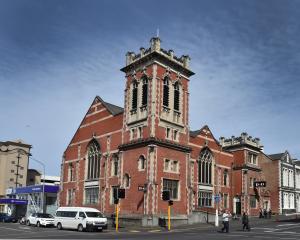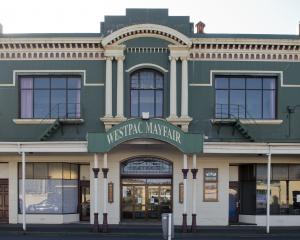
Two comforting arms enveloped Jacinda Ardern from behind, as a face dominated by a beaming smile appeared over her left shoulder.
It was Marian Hobbs, the former Labour cabinet minister, coming to congratulate Ms Ardern on her electoral victory and pregnancy amid the bustle of a Dunedin cafe.

She was one of many well-wishers to approach as Ms Ardern sat, scooping up soup and talking to the Otago Daily Times, under the watchful eye of the Diplomatic Protection Squad yesterday.
But, as one approach was followed by the next, Ms Ardern greeted each newcomer with a bright, welcoming smile and a quick chat.
"Is it all right if I take a picture of the table?" one visitor asked.
"Sure, no problem ... Why don’t you sit down?"
Ms Ardern responded, beckoning to an empty seat.
And, as the pair swapped stories and jokes, Ms Ardern - 37 years old and just three months into her new role as prime minister - lapped up the contact.
Welcome to the Prime Minister’s bubble - the place where pregnancy is a global headline and everyone wants to shake your hand.
But, for Ms Ardern, being within easy reach of the public remains one of the positives of political life in New Zealand.
"That’s something we should be really proud of, I think," she said.
It is a very public role that will have to accommodate a new member of the team from June, following last week’s news Ms Ardern is expecting her first child.
Ms Ardern has already had to find room in her life for the overwhelmingly positive public response to her baby news, as well as the critics.
But Ms Ardern was not concerned, saying she understood the interest and the criticism from some quarters.
"I’m certainly not going to kid myself that that means everyone’s universally wild about the news ... That’s OK. Everyone will have their own opinion.
"People move over time. In part that comes from seeing the job be done and that everything can work out OK. So I know I just have to demonstrate that I can do the job."
And what a job it is, heading a coalition Government already labelled weak by National Party leader Bill English after a compromise on employment law was unveiled this week.
In the deal struck by Labour and its coalition partners, the Greens and New Zealand First, the 90-day trial period will be retained for small businesses — those with fewer than 20 employees — among other changes.
Ms Ardern defended the outcome, saying compromise still improved the status quo and critics such as Mr English showed "a lack of understanding of coalition government".
"Those are the kind of things you say when you’re in opposition though, isn’t it?" she said.
In Dunedin, Ms Ardern’s focus yesterday was on the reopening of the refurbished Dunedin Law Courts, but also other big developments on the city’s horizon.
They include the $1.2 billion to $1.4 billion rebuild of Dunedin Hospital, which Health Minister David Clark said yesterday remained on track to begin construction by 2020, with a recommendation on a preferred site expected by the end of March.
Ms Ardern said Labour’s focus on infrastructure centred on health and education facilities, which was what made the hospital — with its links to the University of Otago - so important.
"We have an ability to tick two boxes with this project if we get it right," she said.
However, she would discuss ways of giving Otago’s mayors more of a say in the project, following criticism they had not been included on the project’s new advisory group.
Attention was also turning to the city’s waterfront and plans for its regeneration by Damien van Brandenburg, of Architecture Van Brandenburg.
Ms Ardern viewed Mr van Brandenburg’s model yesterday and said she was impressed by the concept.
She was "very keen" to encourage the opening up of waterfronts, like in Auckland, and destinations were "really critical to making it work".
With that in mind, the Government wanted to encourage Te Papa to consider shifting part of its national collection to Dunedin, where it could be housed in the cockleshell-shaped cultural centre envisaged as part of the concept, she said.
The Government might also consider financial support, either from the $1 billion regional economic development fund or another source, she said.
"I think it would be worth Dunedin putting forward what its suggestions are and giving us a chance to take a look."
Problems with freedom camping in the Queenstown Lakes district, as with other parts of the country, were also on the agenda, as work on a tourism levy continued, she said.
The $25 fee for arriving tourists would help pay for freedom camping facilities and ease the pressure on councils which were otherwise resorting to bans, she said.
"That’s a much, much better way to go than assuming councils should carry the burden, or just putting in place bans that won’t fix the problem either.
"I think we need to start stepping up at this point."
The Government also expected to announce its inquiry into historic abuse in state care within days, but would not be swayed by calls from some victims - including in Dunedin - to include religious institutions in the inquiry.
An ongoing inquiry in Australia has found faith-based institutions were where most children were sexually abused, but Ms Ardern said the focus would be on the state’s role, where there was greater ability to remedy the problem.
"We’re looking at ourselves because we can fix ourselves. We’ve got to think about the reach we can have into those other institutions, and their need to reform themselves as well."
Despite that, she assured victims of abuse in religious settings their voices would be heard.
The experiences of state wards sent to homes or schools run by religious orders would be covered by the inquiry.
"I also don’t believe we should ever turn away someone ... who wants to share their story", she said.
But, in the meantime, with 5000 children still in New Zealand state care, the inquiry needed to begin, she said.
"I don’t want us to go another day without having learnt the lessons of the past.
"I would hope there would be other institutions who would feel the same."












